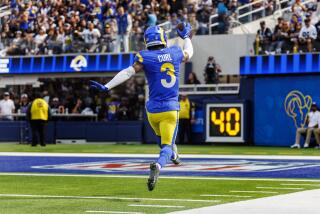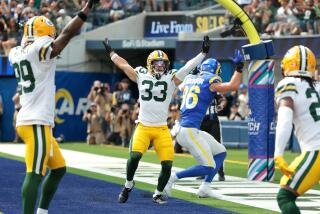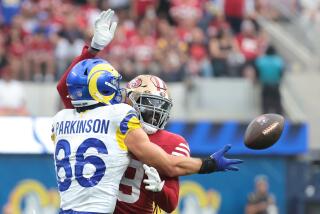Garcia Gets the Points
Jeff Garcia of San Francisco, the NFL’s most improved quarterback, will take the NFC’s second highest scoring team into Carolina Sunday.
As a scoring machine, no team can match the St. Louis Rams, of course, but Garcia has the 49ers averaging in excess of 28 points a game.
And of the league’s 31 teams, only St. Louis and the AFC’s Denver Broncos average more.
For Garcia, whose 19 touchdown passes lead the NFL, a win against the Carolina Panthers would be his third in his last five starts--a record that would be better if his team had a better defense.
This past Sunday, the 49ers offense couldn’t be stopped--but neither could their defense stop the Packers, who won 31-28.
Four-Week Run for Garcia
Few NFL quarterbacks can match Garcia’s run in the last month, in which he is 2-2 following San Francisco’s 0-3 start, which had Bay Area critics demanding his head.
Garcia began the run against Dallas (41-24) and Arizona (27-20), after which he carried Oakland into overtime, where the 49ers’ special teams lost a battle of field goals (31-28). Then he carried Brett Favre into the last minute on Sunday, when a Packer field goal broke a 28-28 tie.
Garcia, who like Joe Montana and Steve Young was a Bill Walsh discovery, went toe to toe all afternoon with Favre, a three-time NFL MVP.
Yet in the end, he couldn’t overcome the contributions of the officials and his own defensive players.
Montana Had It Easier
The 49ers’ third capable quarterback of the last 20 years, Garcia is actually doing more with less now than Montana and Young could do as comparably young pros.
And Montana had one great advantage:
He was there when Walsh’s West Coast Offense was so new and so different that opponents couldn’t fathom what the 49ers were up to.
In those early years--remember?--Montana’s receivers were typically so far open that every fan and expert asked the same question: How is this happening?
Montana threw with marvelous accuracy, but he didn’t really need it to hit a receiver who, in the novel, defense-defying West Coast design, had separated himself by four or five yards from the nearest cornerback.
Since then, NFL defensive coaches have gone to school on the West Coast Offense. And although they still can’t always stop the offensive scheme’s many weapons, today’s players know how to surround West Coast receivers.
Thus, Garcia has been throwing to teammates who are invariably closely guarded.
Whenever San Francisco had the ball at Green Bay, for example, nearly every pair of receivers and defensive backs resembled, as they raced toward the ball, the best of the world’s synchronized swimmers.
In the days when Montana was as new to pro ball as Garcia is now, it would have been interesting to see how he would have handled such a challenge.
Here Come the Saints?
The rise of the New Orleans Saints, who after six weeks rank second to the Rams in the NFC West, is the other story of the year in this five-team division.
Or so it seems.
Although there will be a clearer answer after the 3-3 Saints play Atlanta Sunday and Arizona a week thereafter, Jim Haslett appears to be making a difference as their new leader succeeding Mike Ditka.
A lifelong defensive player and coach, Haslett has naturally built a defense first in New Orleans, where his future, however, rests on how well he understands offense.
He has the running back, Ricky Williams, but in running up a 24-6 score on Carolina the other day, the Saints ran 47 times and threw only 24 passes.
In the Rams’ division, that isn’t the way to the top.
Raiders Near Elite Status
Of the AFC’s three 5-1 conference leaders at this stage of the 16-game season, the Oakland Raiders are better balanced than the New York Jets and better offensively than the Miami Dolphins.
And in their next three starts the Raiders can take their place as one of the NFL’s elite teams with an 8-1 record going into one of the great Monday night games of this season: Oakland at Denver on Nov. 13.
After Seattle plays at Oakland Sunday, the Raiders will get the Chargers at San Diego and then the Kansas City Chiefs in a rematch of their well-earned 20-17 decision at Kansas City the other day.
The only thing worrying their fans is that the Raiders aren’t showing all the offense they should have with a quarterback like Rich Gannon, a receiver like Tim Brown, runners like Napoleon Kaufman and Tyrone Wheatley, and a coach like Jon Gruden who is versed in the West Coast Offense.
Gruden for some reason has turned conservative this season, a strange development for a coach so young.
If he were exhibiting some of Ram Coach Mike Martz’s boldness, the Raiders wouldn’t have to struggle so hard to beat Kansas City by three, San Francisco by three, and even San Diego by three.
Gruden and Al Davis were also taking a chance this year on their comparatively inexperienced new defensive coordinator, Chuck Bresnahan.
But so far, Bresnahan’s platoon has outperformed Gruden’s.
Ram System Makes Faulk
Playing for the championship of Missouri, in a stadium where either side can win, undefeated St. Louis (6-0) will be at Kansas City (3-3) Sunday with a running back who gained 208 yards the other day.
That’s Marshall Faulk, who, despite his impressive rushing yards for the game, lost a yard on third and one, forcing a Ram punt.
Third and one is a running down in pro football, meaning that NFL defenses stack against running backs on such a play.
For that reason, many of the league’s best ballcarriers falter there.
This year, accordingly, the Rams have only rarely called on any runner on third and one.
So how did the man get his 208 yards?
Count the ways.
As St. Louis won, 45-29, Faulk surprised Atlanta by carrying the ball:
On passing downs.
On the plays when Atlanta fielded a four-man line fronting seven teammates playing pass defense.
Whenever the Falcons feared Kurt Warner’s arm more than Faulk’s runs, prompting them to drop into a variety of pass defenses.
And when the Rams surmised that Atlanta was ready to double-cover Faulk on pass plays.
Faulk is a great back, true, but it’s the Ram system that enables him to do so much more than he did in Indianapolis--where the Colts kept him running on third and one.
Pass Defense Harder to Play
Ram Coach Mike Martz, after his first year and a half in St. Louis, is currently football’s foremost offensive leader and among the all-time leaders.
And one explanation is that, as a summa cum laude college man, he’s made the discovery that pass-defense mistakes are more serious than run-defense mistakes.
Football, as people keep saying, is a game of mistakes--but when a defensive player errs on a running play, he might cost his team seven or eight yards.
When a defensive back errs, it could cost a touchdown.
Football is a game in which muscle is dominant on most running plays, the mind on most pass plays.
And as Martz knows, pass defenses make more mistakes than run defenses because NFL pass offenses are more complex and more sophisticated than running-play offenses.
All this has prompted the Rams to throw on most first-down plays, most second-down plays, and most other plays.
This is the first NFL coach in football’s first century seeking continually to establish the pass instead of the run.
Martz keeps beating coaches who like to run on first down--Atlanta’s Dan Reeves, for example--because running teams can count on only a couple of yards on first down, thereafter leaving themselves only two downs to recover.
When you throw on three plays in a row, the odds increase that, somewhere in the series, the pass defense will make a mistake.
Here’s When Martz Runs
It is not precise, of course, to say that Martz has Kurt Warner passing on every down.
In the first half of the Atlanta game, as the Rams drove 97 yards to one of their many touchdowns, there were three stark running-play examples:
On second and six at the Ram seven-yard line, which was a passing down influencing the Falcons to come out in one of their strongest pass defenses, Martz sent in a draw play for seldom-used fullback Robert Holcome, who ran for a first down.
On fourth and two inside the Atlanta 30, another passing down, Faulk gained a portion of his 208 yards with a run to a first down at the Falcon 11.
On second down with inches to go at the Atlanta 2--where the Falcons could have elected to focus either on pass defense or running-play defense-- Martz guessed pass as Faulk’s substitute, Justin Watson of Pasadena, ran for an easy touchdown.
So the Rams are bright and tough and carefully prepared.
On offense.
Their great problem area is still their defense, which almost certainly will prevent a 16-0 Ram run in the regular season and which critically threatens another 3-0 playoff run.
More to Read
Go beyond the scoreboard
Get the latest on L.A.'s teams in the daily Sports Report newsletter.
You may occasionally receive promotional content from the Los Angeles Times.










